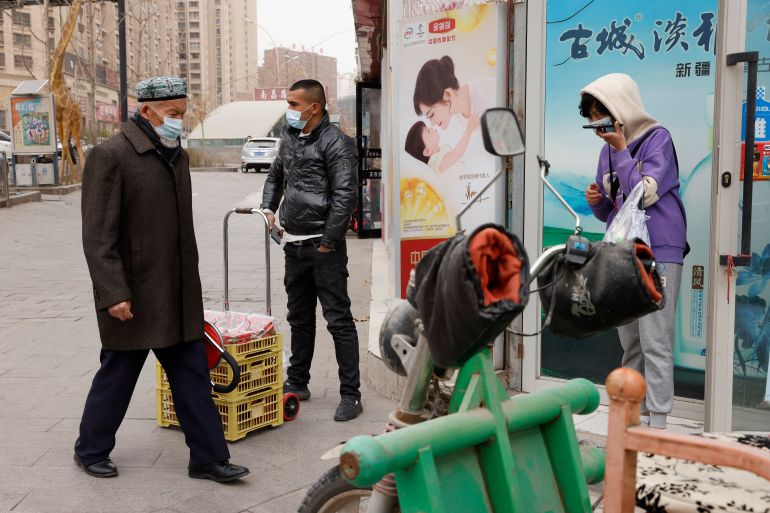Xi Jinping calls for protection of ‘hard-won stability’ in Xinjiang visit
Chinese president visited far western region, where the UN has accused China of possible ‘crimes against humanity’, for first time in a year.

Chinese President Xi Jinping has made a rare visit to Xinjiang, calling on officials to conserve “hard-won social stability” in a region where Beijing is accused of abuses that the United Nations has said could amount to “crimes against humanity”.
The Chinese government has pursued a years-long campaign against what it describes as “terrorism” and “extremism” in the northwestern region, detaining large numbers of Uighurs and other mostly Muslim ethnic minorities.
Keep reading
list of 4 itemsCanada probes Nike, Dynasty Gold on forced Uighur labour in China
US bans imports from China-based Ninestar Corp over Uighurs
Uighur siblings in India jail since 2013 face deportation threat
A UN report last September found China’s actions in Xinjiang may constitute “crimes against humanity” and called on Beijing to immediately release “all individuals arbitrarily deprived of their liberty”, clarify the whereabouts of those whose families have been unable to locate them and undertake a “full review” of its laws on domestic security as well as repeal all discriminatory laws.
The government of the United States as well as parliaments in the United Kingdom, Canada and France have since labelled China’s treatment of the Uighurs as a “genocide”.
Beijing denies the allegations.
State broadcaster CCTV said Xi travelled to the regional capital Urumqi on Saturday, listened to a government work report and delivered a speech “affirming the achievements made in various tasks in Xinjiang”.
It was his first publicly-known visit to Xinjiang since July 2022, shortly before the UN issued its report. That was his first visit to the area in eight years.
Xi “stressed that top priority must always be given to maintaining social stability… and we must use stability to guarantee development”, CCTV reported.
He said it was “necessary to… combine the development of the anti-terrorism and anti-separatism struggle with the push for normalising social stability work and rule of law”, according to the broadcaster.
It said Xi also urged officials to “more deeply promote the Sinicisation of Islam and effectively control illegal religious activities”.
“We must enhance our awareness of adversities… and consolidate our hard-won social stability,” he said, according to CCTV.
“In the process of Chinese-style modernisation, we will better build a beautiful Xinjiang that is united and harmonious, wealthy and prosperous.”
Rights campaigners, overseas researchers and Uighurs living overseas have accused China of a litany of abuses in Xinjiang.
They include detaining more than a million Muslims in a network of camps, forced labour, family separation and destroying the Uighurs’ cultural and religious sites.
Beijing vehemently rejects the allegations, which it says are part of a Western-led plot to smear the country.
It has not denied the existence of the facilities but says they are vocational skills training centres necessary to tackle “extremism”.
In early August, the foreign ministry said some 40 ambassadors and senior diplomats from 25 countries travelled to Xinjiang, met local officials and visited sights including a mosque, an Islamic institute, a rural revitalisation project and a “counter-terrorism and de-radicalization exhibition”.
“The delegation noted that the real Xinjiang is completely different from the stories concocted by some Western media and expressed hope for deeper exchanges and cooperation with the region,” a spokesperson for the foreign ministry said in a statement.
Diplomats from Pakistan, Malaysia, Iran and Egypt were among those on the visit.
In Saturday’s speech, Xi said officials must “strengthen positive publicity and show Xinjiang’s new atmosphere of openness and self-confidence… [while] refuting all forms of false public opinion and negative or harmful speech”, according to CCTV.
The region should also open up further to domestic and foreign tourism, Xi said, according to the broadcaster.